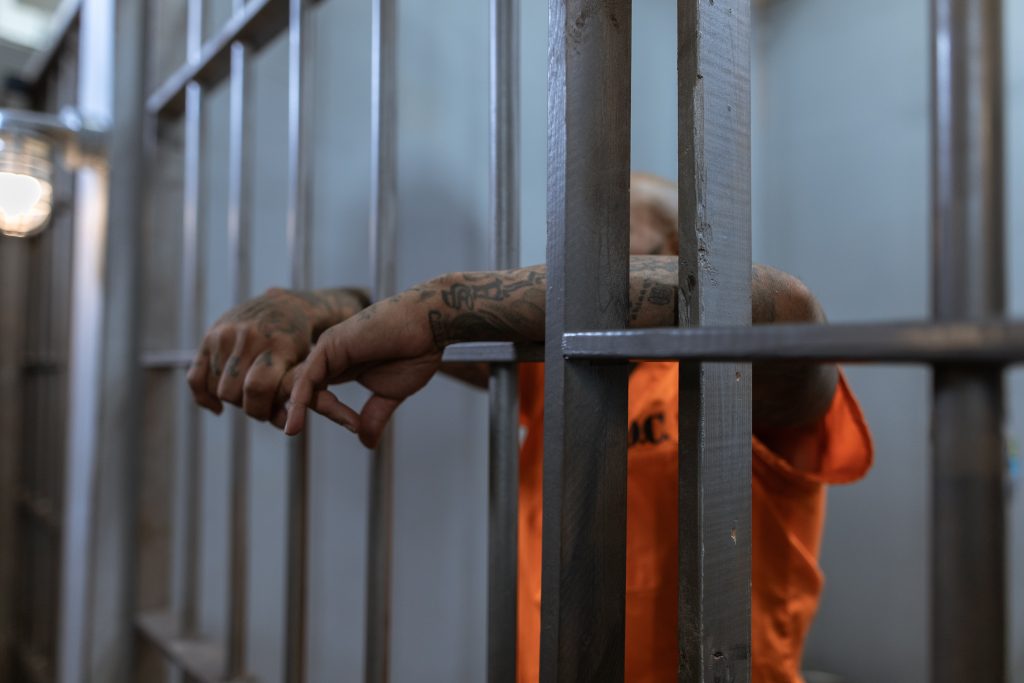As Jutarnji writes, Ines was supposed to go to prison because she had accumulated fines for driving without a driver’s license. When she finally did all the required hours in the driving school and passed the driving test, she went to pick up her driving license with her certificate. She found out she could not get her driver’s license due to unpaid fines. So she went to the prison in July 2018 but was not provided a spot there due to overcrowding.
“I am a child from the village, I have driven a tractor since I was little, and I also learned to drive a car. It’s normal there. I needed a means of transport to deliver products from the farm”, said Ines, who owns a business making natural products. When she went to pick up her driver’s license, the clerk told her that she thought she had seen everything and nothing could surprise her, but Ines had proven her wrong. She told Ines that it was a shame she couldn’t obtain her driver’s license since her photo turned out so well. “I didn’t have the money to pay the fine, and the statute of limitations would only kick in after three years. I decided to do community service to pay it off, and I was tasked with washing bus stops and cleaning the town hall that was being built at the time. A job is a job; I preferred to do that rather than pay a fine”, said Ines. Bus stops were often plastered with posters with adhesive coating, making removal even more difficult. Ines called a friend who sprayed them with chemicals and saved herself the trouble of scrubbing and peeling. She treated him to beer and ćevapi, but she doesn’t consider it “cheating.”
“My eldest daughter brought me “worker’s sandwiches,” and I had coffee breaks. My friends were worried about how I would feel about cleaning the bus stops because there are always those who enjoy seeing you down and making fun of you, but it wasn’t a problem for me at all”, says Ines. While doing community service, she paid some of the fines in installments and kept driving using her test certificate. With two installments left to pay off the fine, she was stopped by the police again. She earned a new ticket for operating a motor vehicle before becoming eligible for that and ended up in court.
“The judge was not interested in whether I passed my driving test. She nervously yelled at me to show her the driver’s license, showing me hers and explaining that it had to look like that. I told her I didn’t have one while looking out the window to see if I would get another fine, considering that the hearing took longer than expected”, said Ines. She was sentenced to a fine of three thousand kunas, followed by three days in prison. The judge immediately warned her that it would be difficult to get into prison and mocked her as she said. “I saw it was not worth wasting my energy; the judge had some personal issues. I even wanted to hug her. It wasn’t clear why she was sending me to prison in the first place when she knew I wouldn’t get in”, Ines recalls.
She paid the fine and tried to get her driver’s license. The officer told her that she could not get a driver’s license until she served three days in prison and added that the prison was full and would not accept her. She advised her to wait three years for the period of limitations to expire and then pick up her license. She immediately remembered the judge’s laugh when she was sentenced to three days in prison. “I was weighing out the probability of being stopped by the police because I had to keep working and providing treatment for my sick child. I decided to serve those three days because there was no way I wouldn’t be stopped in the next three years. I made an appointment with the judge”, she said. She explained to the judge that she had to transport apples and dried meat to the coast and that there was a chance that she would be fined again. She begged to be sent to serve a sentence of three days in prison because she had no other way to get her driver’s license.
“She looked at me in wonder over her glasses. She said that she was 56 years old and that this was the first time someone was not asking for a delay but wanted to go to prison. We both started laughing”, Ines recalls. She decided to write her a referral for prison, and one of the days she was supposed to spend in prison fell on her birthday. “I was delighted and commented that I would tell my grandchildren that I spent my birthday in prison. The judge said it was not right and that she would change the dates. She entered some dates, and that was it”, said the future prisoner.
The judge explained to her that there would be a problem if she got stuck in prison for the weekend because there would be a possibility that she would have to stay longer than prescribed. She was given a list of what she was allowed to bring into the prison. “The list included hygiene items that must be in transparent packaging, medicines if necessary, trousers and shoes without laces, while bras, wires, and tapes are prohibited,” said Ines. She thanked the judge and started looking for a connection to break into the prison. She asked if anyone knew a guard or anyone to help her break into the prison.
“I found out that the manager was a soldier. I called my ex-husband, a colonel, to see if he knew him. They asked him what had happened to put me in prison”, said Ines. Her friends threw her a party before going to prison, they teased her for days, and then advice started pouring in from all sides.
“My mom acted like I was going to a Paraguayan prison, like from the Prison Break series. She warned me not to brag and not to mess with anyone. She assured me that the state would punish those guilty, and God would judge them”, Ines recalled.
The mother of four was showered with advice from her children. She tried to turn everything into a joke to make it easier for them to get through that period. She joked that she would come back with a tattoo and visible abs.
“My eldest daughter Mirna said that the prisoners would be sorry when I got out of prison, and Doris told me that she bet I would click with a prisoner and remain friends forever. My son Šimun told me not to adopt another child, while youngest daughter Tessa asked if I would stay for a long time because she would rather be with me than with her father”, said Ines.
To minimise her baggage for three days, she took a shower in the morning because she decided she would not shower in prison. “I put on a cotton top, two pairs of underpants, tights, and flip-flops because it was written that I had to have slippers without laces and buckles. I took a transparent toothpaste, a toothbrush, an ID card, five hundred kunas to put on the canteen card, put a towel on my shoulder, and was on my way”, Ines explained. She handed the children to her ex-husband and arrived in front of the Osijek prison in flip-flops with a towel on her shoulder.
“I came to the doorman and hoped I could do my three days. I submitted the paperwork, and soon the deputy director appeared and told me there was no room. I tried to explain that if I didn’t get my driver’s license, I would have to keep cleaning bus stops until I retire”, Ines said.
The director told her that two cells had to remain empty due to domestic violence emergencies and investigations, and priority was given to those with sentences longer than 14 days. The Osijek prison only has one women’s wing, which was fully occupied. She asked if he would admit domestic violence to her if she had a little quarrel with her ex-husband.
“The deputy came back after about 15 minutes because he had found me a place in the detention centre. They didn’t give it to me in the end so that I wouldn’t sue them in the human rights court. Finally, they gave me written confirmation that I came to serve the sentence of my own free will and that the system did not allow me to do so. He said that even the judge called to help me get in”, added Ines.
She went to have coffee and then to get her driver’s license, which she was finally able to obtain.
“When people pass their driving test, they first tell their family and friends, and I told the police first. My father used to tease me that he was saving for my brother’s education and my bail”, said Ines.
Last year, the period of limitations finally expired, and now she no longer has to fear going to prison and serving a sentence.
Jutarnji asked the Ministry of Justice and Administration about this particular case and published the reply:
“Persons deprived of liberty are admitted to the prison system based on the decision of the competent court. When the competent court orders pre-trial detention or orders a person to serve a prison sentence based on a final judgment, the same person is sent to and admitted to a penitentiary or prison in accordance with the court’s decision. Regarding your inquiry about the “order for serving a sentence for criminal offenses,” we point out that persons deprived of their liberty are sent to the prison system exclusively based on clearly prescribed legal provisions that do not know the institution of “waiting.”
Convicted persons are sent to serve prison sentences based on the decision of the execution judge who is competent to send them to serve prison sentences. We emphasize that the fundamental task of the prison system is to protect society from criminals. Anyone who poses a threat to an individual, organisation, or the legal order of the Republic of Croatia, and who has committed a misdemeanor or a criminal offense for which a prison sentence is prescribed, or who, by the Law, can or should be sentenced to pre-trial detention, may be sent to the prison system.
The prison system of the Republic of Croatia will receive all persons who have been deprived of their liberty by court decisions.
When it comes to the capacities of the prison system, the Ministry of Justice and Administration is implementing a series of measures to expand the capacities. In the last three years, the capacities of the Prison in Bjelovar and the Penitentiary in Požega were renovated and expanded, parts of the Prison in Osijek were renovated, and the closed facilities of the Prison in Požega were expanded, which increased the total capacity by about 120 places.
Works are underway in Požega and Lipovica, which will provide additional capacities of closed conditions for 230 places, relieving the prisons in Osijek and Zagreb.
The Ministry of Justice and Administration has introduced electronic monitoring for parole, and the preparation of the Rulebook on the method of execution of pretrial detention in the home with the use of electronic monitoring is underway, which will further relieve the capacities of criminal authorities, says the response of the Ministry of Justice and Administration.
For more, make sure to check out our dedicated Lifestyle section.











